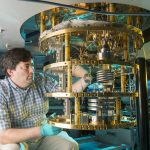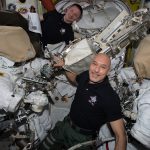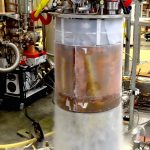From SLAC, Jan. 13, 2020: Matching up maps of matter and light from the Dark Energy Survey, hosted at Fermilab, and Fermi Gamma-ray Space Telescope may help astrophysicists understand what causes a faint cosmic gamma-ray glow.
dark matter
From Gizmodo, Dec. 13, 2019: Fermilab scientist Dan Hooper is quoted in this article on a new paper that says dark matter could be responsible for the mysterious observation of gamma rays in the center of our galaxy.
From Time, Dec. 6, 2019: Fermilab scientist Dan Hooper summarizes the current state of the search for dark matter. Scientists can say with great confidence that we understand how and why our universe evolved over the vast majority of its history. From this perspective, the universe looks more comprehensible than ever before. And yet, not all is understood.
From The Mac Observer, Nov. 25, 2019: In this 30-minute podcast episode, Fermilab scientist Dan Hooper recounts how he caught the astrophysics bug as an undergraduate, landed a postdoc position at Oxford and was later hired at Fermilab. He chats about his interest in the interface between particle physics and cosmology, dark matter and what neutrinos can tell us about the early universe.
A series of joint NASA and ESA spacewalks four years in the making aims to extend the life of the AMS particle detector. On Nov. 15, astronauts took on a series of tasks ranging in difficulty from zip-tie-cutting to safely launching a piece of equipment into space, all while orbiting the planet at around 5 miles per second. The goal was to fix a component of the Alpha Magnetic Spectrometer, an international particle physics experiment, and to extend its study of cosmic rays, dark matter and antimatter for another decade.
From Science, Nov. 12, 2019: Three years ago, a team of particle astrophysicists appeared to nix the idea that a faint glow of gamma rays in the heart of our Milky Way galaxy could be emanating from dark matter. But the conclusion that the gamma rays come instead from more ordinary sources may have been too hasty, the team reports in a new study. So the dark matter hypothesis may be alive and well after all. Fermilab scientist Dan Hooper is quoted in this article.
From Forbes, Oct. 30, 2019: Dark matter was proposed in the 1930s and has eluded detection for nearly a century. However, an advanced and high-tech detector called LUX-ZEPLIN has just been installed that might change all of that. Fermilab scientist Don Lincoln gives an overview of the experiment.




